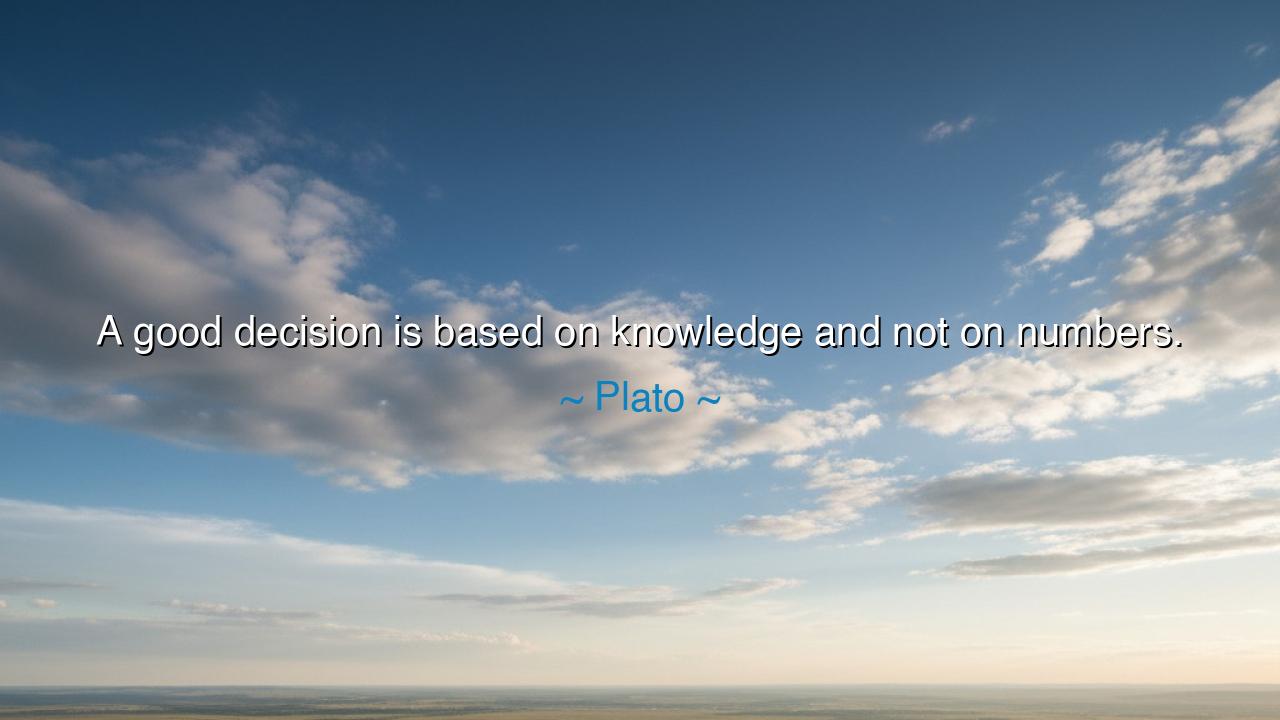
A good decision is based on knowledge and not on numbers.






Hear the timeless words of Plato, student of Socrates and teacher of kings, who declared: “A good decision is based on knowledge and not on numbers.” In this saying lies the essence of wisdom itself, a reminder that truth is not measured by the weight of the crowd nor the counting of figures, but by the clarity of knowledge. Numbers may be many, and voices may be loud, yet without understanding they are but noise. To decide rightly is to pierce through the clamor and seek the light of truth.
The ancients knew this well. In the days of Athens, the assembly often voted by majority, raising hands to decide the fate of war, law, and justice. But Socrates warned that the voice of the many is not always the voice of wisdom. A thousand men ignorant of medicine cannot heal a single sick child better than one physician who knows. Thus Plato, inheriting this lesson, taught that decisions must be rooted in knowledge, not in the mere counting of opinions or figures.
Consider the story of Pericles during the Peloponnesian War. The people, swayed by numbers and passion, often clamored for reckless attacks. Yet Pericles counseled restraint, guided by knowledge of strategy and foresight. While the numbers of voices shouted for immediate glory, he knew that patience and planning were the true path. Though not all he advised was heeded, his wisdom prolonged Athens’ strength far longer than the multitude’s desires would have allowed. Here we see Plato’s truth: numbers may push toward folly, but knowledge guides toward wisdom.
History gives us another mirror in the tale of Galileo Galilei. In his time, the numbers—of leaders, priests, and citizens—stood against him, insisting that the sun revolved around the earth. Yet Galileo, armed with the knowledge of his telescope and the courage of reason, stood firm. The multitude had numbers; he had truth. And in the end, though silenced for a season, his decision to cling to knowledge reshaped the destiny of science forever.
Plato’s teaching speaks also to our age. In times of wealth and governance, leaders are often tempted to trust only the numbers: profits, votes, statistics. But numbers are hollow if they lack wisdom behind them. A decision made by counting gains while ignoring justice may prosper for a season, but it destroys in the end. Numbers may measure what is, but knowledge discerns what ought to be. Numbers are tools; wisdom is the hand that must wield them.
Yet let us not despise numbers, for they have their place. Numbers can guide, measure, and warn. But when numbers are mistaken for wisdom itself, they become idols. The wise man does not ignore them, but places them beneath the higher authority of understanding. Just as a sailor uses the stars to navigate but trusts his knowledge of the seas to survive the storm, so too must we use numbers as instruments, not as masters.
The meaning, then, is clear: good decisions are not born from the weight of quantity, but from the depth of truth. To decide by numbers alone is to follow the crowd into blindness; to decide by knowledge is to walk the harder but truer path. This is why Plato entrusted the idea of rule not to the many, but to the philosopher-king—the one who seeks wisdom above all else.
The lesson for us all is this: when faced with choices, do not be swayed only by what is popular or by what seems easily measured. Seek knowledge—learn, reflect, ask, and discern. Listen not only to how many voices speak, but to the weight of the truth within their words. In your work, in your family, in your life, let your decisions be guided not by numbers alone, but by wisdom rooted in truth. For as Plato declared, a good decision is based on knowledge and not on numbers—and this principle, if lived, will guard your steps through every age.






AAdministratorAdministrator
Welcome, honored guests. Please leave a comment, we will respond soon